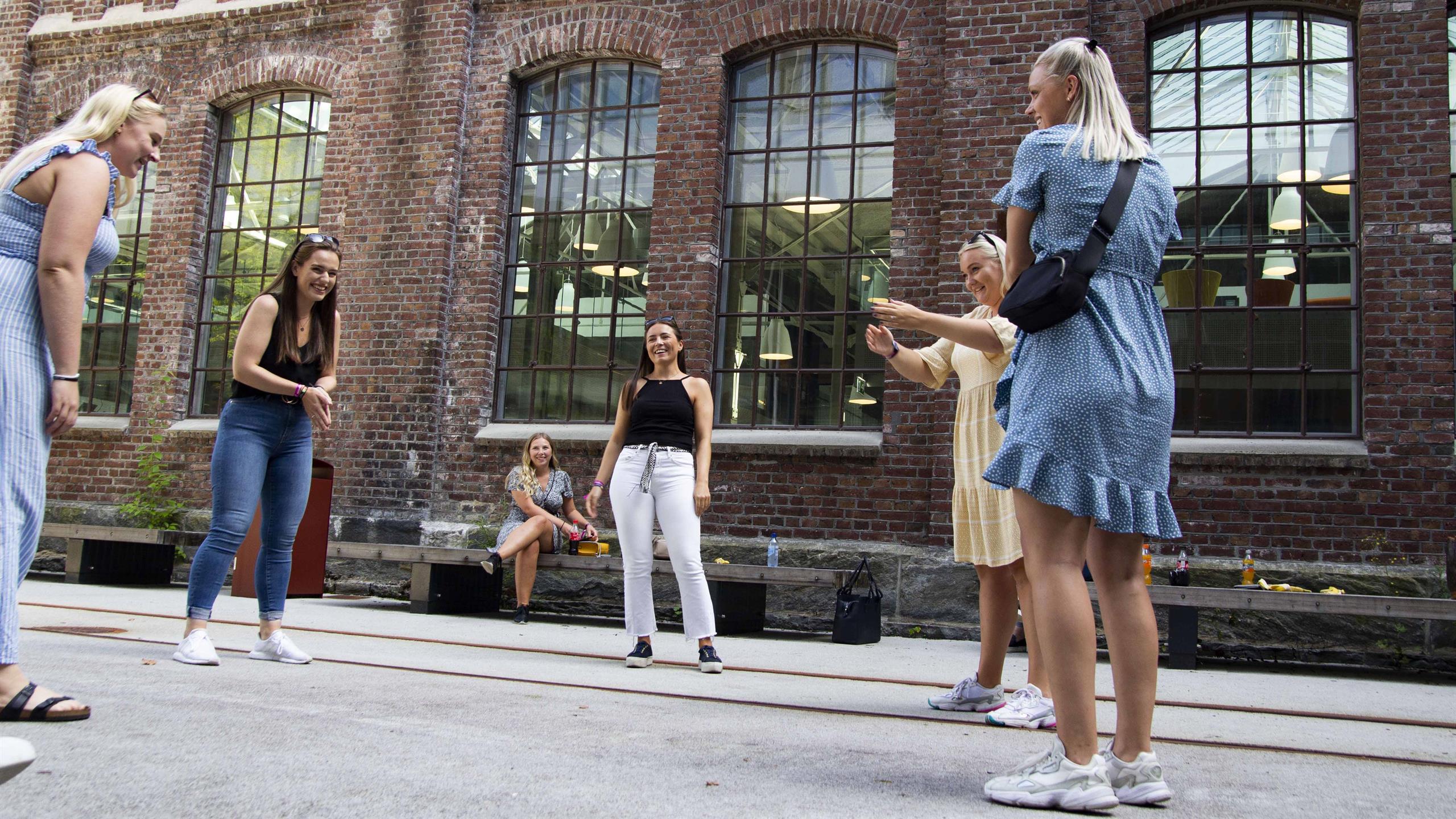Hosted by Western Norway University of Applied Sciences 20-23 March 2023 at campus Kronstad, Bergen

The PROFRES symposium in Bergen will concentrate on the connection between welfare state, professional work (exemplified as care work) and practices, and not least how we can analyse the professional practices that we endeavour to investigate.
We will pay particular attention to how these practices can be grasped through qualitative methodologies, with an emphasis on ethnography.
A rich variety of ethnographies will be presented, as well as how these ethnographies produce different knowledge on professional work and practices across the welfare sector.
As a PhD-candidate you will be invited to reflect on your methodologies and how you present your methodologies in your work (e.g the binding text, articles, chapters). Therefore, the last day is arranged as a session on “how to write the binding text (kappe)” in relation to methodology and structure.
Keynote: Hanne Marlene Dahl
Governance, Professional identities, and Care in times of a Care Crisis

Governance within health and care is changing and governance paradigms matter as they form, and limit identities and care provided. New Public Governance (NPG) has become the new buzzword stressing trust, collaboration and regulated self-regulation. At the same time new forms of managing and standardizing care still emerge e.g. care pathways related to NPM. Standardizing care and its coordination, however, often does not work by itself, but it requires a lot of informal coordination to work successfully – aspects that are often silenced within non-feminist work. Professional agency is important to tinker with care, where they also navigate their professional identities, and when they increasingly mobilize around issues of recognition and redistribution. We witness struggles about the role of care – and its framing - in our societies as care, care workers and care professionals increasingly find themselves under strain in an emerging care crisis in the Nordic countries.
In this presentation I pose the following the question: How can we understand the current situation of care and the health services in the Nordic welfare regimes and which analytical notions are fruitful in research? I will look at the notions of assemblage, logics of care, professional agency, silencing and gendered aspects – and show how they give us a new map of care that fits better to the new, emerging landscape.
Keynote: Professor Betina Dybbroe
Transformations in social and health care that challenge universalism in Nordic Welfare States-silencing inequity, social vulnerability and social needs

The current transformations in care include a rising detachment between central and decentral political and governing responsibilities for creating universal and equal health and social care- and the institutional, practical frames and resources for creating equal, socially responsible and compensatory social and health care. The health and well being of elderly, the fatally ill, people with chronic and mental illness are specially threatened. Following this we see in research that the meetings in care exceedingly demand prioritization and taking responsibilities of needs and tasks on an individual professional level, challenging the ethics of professionals. Social inequality, social suffering and social and health needs become exceedingly silenced, segregated, neglected and the source of conflicts in care practices.
These transformations in universalism may be studied through the experiences of citizens and in practice near research of professional practices, meaning making and relations between the professionals and citizens. I will draw on cases from research over the last ten years into care practices and relations between professionals and citizens in various parts of social and health care: in psychiatric care, municipal elderly care, municipal health care for children, hospital care of the very ill and in palliative care. Theoretically the presentation is informed by the theories of social suffering and illness (Conrad, Kleinmann) social epidemiology of inequity and the psychosocial environment of health (Martikainen, Marmott), social class, health and recognition (Fraser, Skeggs) and the theory of social vulnerability and health (Finemann).
Keynote: Anette Fagertun
Anette Fagertun, phd 2009, social anthropology, holds a position as Associate Professor at Centre for Care Research west, HVL. Fagertun has extensive fieldwork experience from Indonesia, Norway and the Netherlands, and her main interest area in research is labor in all its modes and arrangements and the ways it is tied to ideational and hegemonic powers and constitutes one of the key pillars of society. Her main expertise is within the fields of political economy and philosophy, and in anthropology of labor, gender and class. Fagertun publishes on topics such as diversity and migration, welfare system and social policy, labor inclusion and gender, and local statehood, service provision, and ideational power. She supervises several PHD candidates, teaches at all levels, and has over the last years concentrated teaching in the philosophy and theory of science at phd level. Fagertun is currently involved in three large RCN-funded research projects as project manager and as principal investigator.
Program
PROFRES Spring Gathering 2023
Monday 20th, campus Kronstad
The main topic of the Monday session will be professional work and welfare state with examples of care work, inequality, professional identities and gender.
- 12:00 Lunch
- 13:00 Welcome by PROFRES Director Birgitta Haga Gripsrud, UiS, and Professor and PROFRES staff Christine Øye, HVL. Room: Aud 9 (D112)
- Panel: The importance of inter-disciplinary research. Moderator: Professor and PROFRES staff Gudmund Ågotnes, HVL. Panel participants: Professor Jonna Lappalainen, Södertörn University, Professor and PROFRES staff James N. McGuirk, Nord/VID, Associate Professor and PROFRES alumni Elin Salemonsen, HVL, and PROFRES candidate Oddvar Aalde, HVO.
- 13:45 Keynote: Professor Hanne Marlene Dahl, RUC: "Governance, Professional identities, and Care in times of a Care Crisis”
- 15:15 Coffee break
- 15:30 Keynote: Professor Christine Øye and Professor Anette Fagertun, HVL: "To be announced"
- 18:00: At the Terminus hotel, Ambrosia room we will have a sofa discussion on the topic welfare state, care work and inequality, led by Associate Professor Anette Fagertun, HVL. Participants: Professor Hanne Marlene Dahl, RUC, and PROFRES candidate Erika Eidslott, VID.
Thereafter, we will have a fun fact introduction of all candidates. Two and two candidates will tell each other a fun fact about themselves. The candidate will introduce the other candidate’s fun fact. - 19.30 Dinner at Terminus
Tuesday 21st, campus Kronstad
Today we will have focus on the candidates own PhD-work, either work in progress or methodologies in use. Therefore, there will be workshops and walk-and-talk to reflect on your own methodologies with peers.
- 09:00 PROFRES Director Birgitta Haga Gripsrud, UiS, introduces Work in Progress and presents upcoming PROFRES activities.
- 09:30 Presentation of work in progress (group rooms: M402, M403, M415, M416, M417, M515, M516 M517)
- 12:30 Lunch
- 13:30 -16:00 Presenters: Shut up and write based on feedback. Academic staff will be available.The group rooms M402, M403, M415, M416 and M417 are available until 16.00, and room M408 is available from 14:15.
- Non-presenters: Walk and talk with peers on methodology used in own PhD-work (candidates will be mixed based on similar methodology). Groups of two and three (the groups will be predefined based on similarities in methodologies)
- 15:00 Coffee break outside room M408
- 19:00 Dinner at Ulriken
Restaurant Skyskraperen is spectacularly located near the top of Mount Ulriken. To get there, we will take the Bergen light trail Bybanen from Nonneseter to Haukeland (approx. 8 mins), before we will take Ulriken cable car to the top (5 mins). You are free to make your own way to the restaurant or meet in the hotel lobby at Terminus for a joint departure at 18.15.
If you come straight from campus Kronstad - you can take the light rail one stop: Kronstad-Haukeland.
Wednesday 22nd, Campus Kronstad
Today we will focus on ethnography in general, it`s methodologies and traditions. That is, we will be presented a rich variety of using ethnography for the purpose of producing knowledge across the welfare sector.
- 09:00 Keynote Associate Professor Anette Fagertun, HVL: «Analysing the welfare state through the lens of Institutional ethnography (IE): the value of everyday experiences”. Room M408
- 10:00 Comments
- 10:15 Break
- 10:30 Ethnography relay (stafett)
- PROFRES candidate Lene Cherize H. Sirevåg, UiA: "Embedded and in between daily rhythms – ethnography in schools"
- Professor Gudmund Ågotnes, HVL: “Multisite, team based and rapid ethnography”
- Associate Professor Trond Grønnestad, UiS: “Streetwise Ethnography»
- 12:30 Lunch
- 13.30 Ethnography relay (stafett) continues
- Associate professor Minna Sorsa, TAU: “Using focused ethnography to develop complex healthcare settings”
- Professor Christine Øye, HVL: “Critical ethnography in public sector innovation”
- 14:30 Coffee break
- 15:00 – 16:00 Reflections on methodologies based on walk – and-talk sessions on Tuesday and based on todays presentations (in small groups and in plenum). Rooms: M408, M316, M317, M503
- 16:00 – 17:00 Candidates' corner. Room M408
Thursday 23rd, campus Kronstad
Today we will focus on: “How to write the “Kappe” or binding text” in the thesis. There will be a mix of presentations and group work by recent PhDs within nursing and teaching education, and experienced professors.
- 09:00 Presentation of recent PhD Fredrik S. Hagen, HVL: “How I wrote my “kappe” and relevance for the teaching profession”. Room the whole day: Aud 9 (D112)
- 09:30 Presentation of recent PhD Oda K. Nordfonn, HVL: “How I wrote my “kappe” and relevance for the nursing profession”
- 10:00 Break
- 10:15 Professor Linda. L. Andersen, University of Roskilde and head of PhD education: “What is a Kappe” (the binding text) in a thesis: purpose, formal requirements, tricks, and writing strategies. Followed by a group exercise in pairs of two: how to provide an overview of journal chapters and the kappe.
- Plenary presentation of group exercise and discussion
Background readings:- Lisbeth Lundahl (2010) On the choice of thesis format and on writing the ”kappa” of a thesis of publications. Umeå universitet Inst för Tillämpad Utbildningsvetenskap
- Guerin, C. (2016). Connecting the dots: Writing a doctoral thesis by publication. In Research literacies and writing pedagogies for masters and doctoral writers (pp. 31–50). Brill
- 12:00 Lunch: “Grab and go”